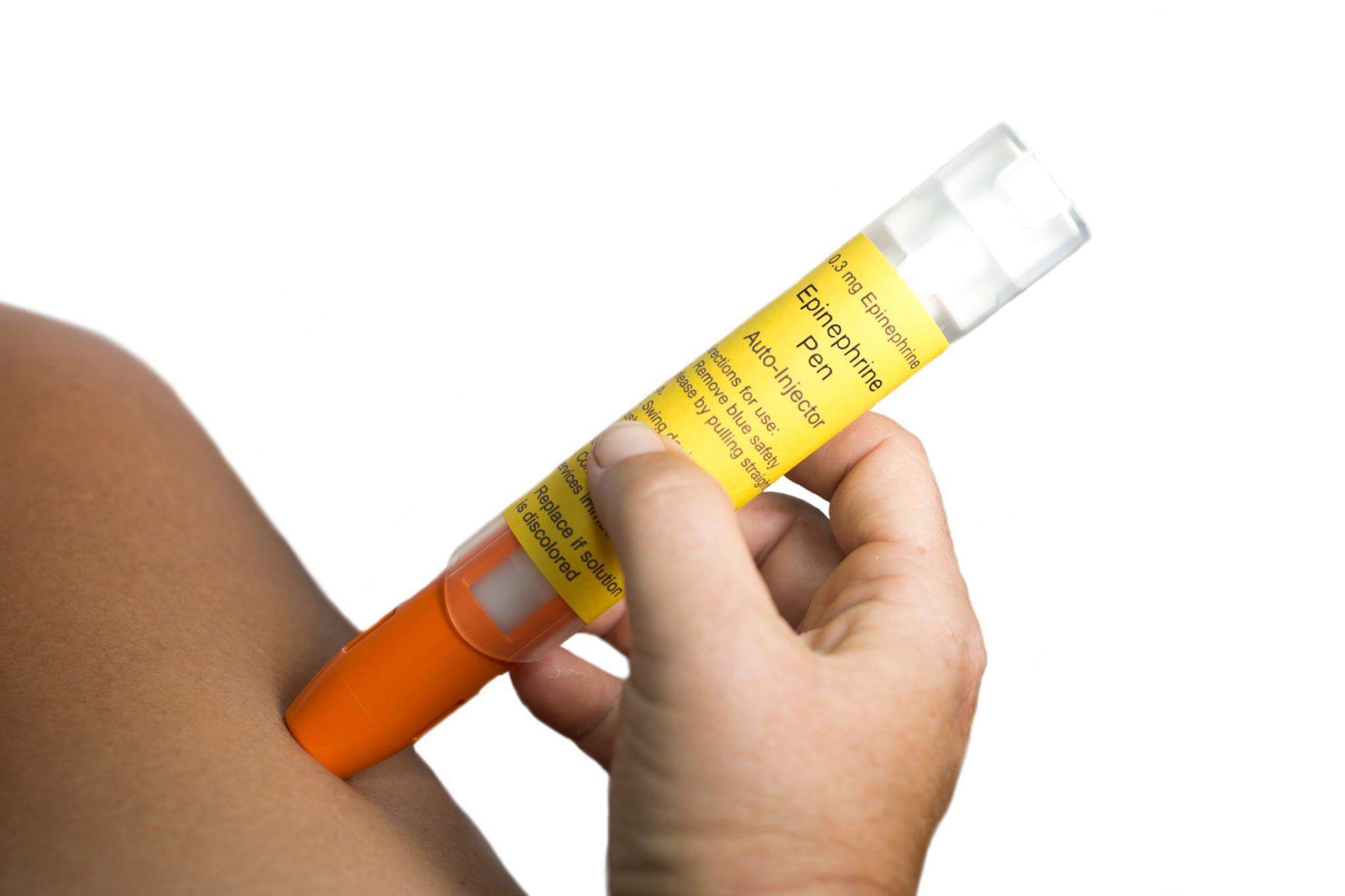Highlights
- Allergic reactions are the results of an overactive or misguided immune system.
- Some allergic reaction symptoms can be life-threatening.
- Doctors can treat allergies with sprays, pills, drops, or epinephrine shots.
- You can find the lowest price for allergy medications with BidRx.
Allergic reaction symptoms are the consequences of an overreaction of the immune system to allergens. Allergens are substances that trigger allergic reactions when they come into contact with the skin, the nose, the mouth, the eyes, or the lining of the stomach and guts. 41.7% of US adults suffer from some form of allergy.
Allergic Reaction Symptoms and Their Triggers
Allergic reaction symptoms range from barely noticeable to life-threatening. Anaphylaxis, or anaphylactic shock, is the most severe allergic reaction, and it can cause death if it’s not treated in time.
Different allergens cause different allergies and trigger different symptoms.
Allergic Rhinitis
Commonly called hay fever, allergic rhinitis affects the nasal airway. It’s caused by pollen, dust, or other airborne allergen particles. Its symptoms are:
- A stuffy or runny nose
- Sneezing
- The irritation of the mucus membrane of the nose and the palate
- Swollen and itchy eyes
Eczema
Eczema is an allergic reaction of the skin. Skin allergies can result from contact with materials like latex. Their symptoms tend to be localized and less severe. Eczema symptoms include:
- Itchy, irritated skin
- Redness at the affected site
- Peeling or flaking of the skin
Despite its less-severe symptoms, eczema can ruin your quality of life if you leave it untreated.
Food Allergies
Food allergies can be severe, as food-borne allergens linger in the body for longer and are more difficult to eliminate. Some food allergy symptoms are:
- Swelling of the throat, face, or lips
- Difficulty breathing
- Hives
- Tingling sensations in the mouth
- Anaphylactic shock
Insect Sting Allergies
Insect stings involve more or less potent toxins that make their way into the body, causing pain, irritation, and allergic reactions. Some allergic reaction symptoms to insect stings are:
- Unusually large swelling at the site of the sting
- Difficulty breathing
- Tightness around the chest
- Wheezing and coughing
- Hives breaking out locally or all over the body
- Anaphylactic shock
Insect stings are more likely to produce severe symptoms than other allergy triggers.
Drug Allergies
Drugs, both prescription and over-the-counter, may trigger severe symptoms that can take life-threatening turns. Patients allergic to any medication should look out for these symptoms:
- Rashes
- Swelling of the face
- Difficulty breathing and wheezing
- Hives
- Itchy and irritated skin
- Anaphylactic shock
Severe allergic reaction symptoms like anaphylaxis, or anything that impairs breathing, require immediate medical attention.
Anaphylactic Shock
Unlike less-severe, localized allergic reactions, anaphylaxis affects the entire body. It is life-threatening, as it can lead to a respiratory collapse and cause the victim to suffocate.
Currently, only 1%-3% of the world’s population will experience anaphylaxis, but the prevalence of the condition is rising.
Many allergens can trigger an anaphylactic shock.
- Bee stings
- Latex hypersensitivity
- Foods
- Vaccines
- Medications
Sometimes, anaphylactic shocks occur without known triggers. Doctors call these instances of anaphylaxis idiopathic anaphylaxis.
The symptoms of anaphylaxis are severe:
- Vomiting and nausea
- Lightheadedness
- Rapid heartbeat
- Breathing difficulties
- A drop in blood pressure
- Rashes
- Fainting
- Anxiety and the feeling of impending doom
- Abdominal pain and discomfort
- Hoarse voice
- Cardiac arrest

Anaphylactic shock requires immediate intervention.
Fortunately, most allergic reaction symptoms are not life-threatening. Even mild symptoms can ruin your quality of life, however, if they occur often and you can’t alleviate them quickly.
Allergic Reaction Causes
Our immune systems react to foreign substances, thus protecting the body from poisoning and profound damage. How the immune system reacts differs from person to person.
A bee sting may be a minor annoyance for one person and the cause of a life-threatening systemic reaction for another.
The immune system creates antibodies to fight the foreign substances that enter the body through food, drugs, insect bites, or skin contact. Sometimes immune systems may “think” that an otherwise harmless allergen is dangerous and attack it.
- Airborne allergens. These particles float in the air and can be difficult to escape. You may be allergic to dust mites, mold, flower pollen, or animal dander. A dander allergy explains why some people have unpleasant reactions to cats or dogs.
- Food-borne allergens. Many foods contain substances that may trigger allergic reactions. Some of these foods are milk, flour-based products, soy, eggs, shellfish, and peanuts.
- Insect stings. During our lifetime, 94.5% of us suffer insect bites. The most frequent causes of allergic reactions are honeybee and wasp stings. Hornets, bumblebees, and even some fly stings can trigger allergic reactions. Due to their size and the amount of poison they inject, hornets are particularly dangerous.
- Medications. Penicillin is a common cause of severe allergic reactions. Before giving patients penicillin injections, doctors will perform a skin-deep test shot to assess the patient’s reaction to the medicine. Other penicillin-based antibiotics may trigger allergic reactions as well.
- Touch-based allergens. Latex is an example of a material that can trigger allergic reactions in some people when it comes in contact with skin.
Allergic Reaction Risk Factors
Several factors can play a role in the development of allergies. They include:
- Age. Children are more likely than adults to develop allergic reactions.
- Genetics. If you have a family history of eczema, asthma, or other allergy-related condition, you are more likely to develop an allergy yourself.
- Repeated exposure. Repeated or prolonged exposure to allergens can increase the likelihood of sensitization. Following sensitization, even a small exposure to the allergen can trigger allergic reaction symptoms.
Allergic Reaction Diagnosis
In addition to asking questions about your symptoms and performing a physical examination, doctors can diagnose your allergies in two ways:
Prick testing. Your provider will superficially prick your skin with proteins from a series of allergens. If you are allergic, your skin will respond by developing hives in the test area.
Blood tests. Allergy blood testing allows your doctors to measure the number of antibodies in your blood. Doctors can test blood samples for sensitivity to various allergens.
Allergic Reaction Treatment
There are three primary treatment options for allergy symptoms. Talk to your doctor to find out which is right for you.
Avoidance. Avoiding the allergens you know can trigger your allergic reactions is your first line of defense. Don’t expose yourself to allergens hoping that your medication will protect you.
Medication. There are many eye drops, nasal sprays, pills, and liquid medications available that can ease your allergic reaction symptoms almost instantly. However, it’s not a good idea to become overly reliant on over-the-counter medications. When possible, avoidance is always the best option.
Epinephrine injections are a last-resort solution for severe allergic reactions like anaphylaxis. Some people with severe allergies always carry epinephrine shots with them.
For a detailed list of medications used to treat allergies, read our Reference Guide to Allergy Medications.
Allergen immunotherapy. With immunotherapy, your doctors can train your immune system to tolerate the presence of an allergen. They will give you increasing amounts of purified allergen extract, promoting the immune system to get used to its presence and reduce its production of the antibodies that attack the allergen.
Find the Lowest Price for Allergy Medications

To manage your allergies and reclaim your quality of life, you must use allergy medications regularly. Find the lowest price for allergy medications to make your allergy management affordable.
Allowing pharmacies to compete for your business by engaging in a bidding war is the best way to find the lowest price for allergy medications. It’s easy! Here’s how to get started:
- Create an account at BidRx.
- Find your allergy medicines on our medication page and create a bid.
- Let pharmacies compete to fill your prescription.
- Receive your allergy medications.
You may get offers from online or local pharmacies, and you can choose the offer that works best for you. Create your bid today!
